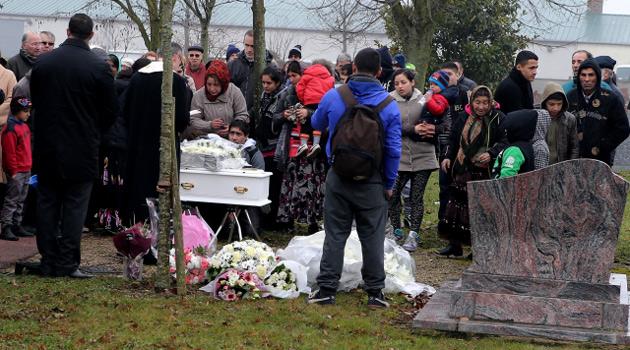France: Immigrant Romani infant buried near Paris after being refused burial elsewhere

In the community of Wissous near Paris a Romani infant was buried Monday during a ceremony attended by hundreds of people. The nearby small town of Champlan had previously refused her burial in their cemetery.
The local government’s refusal caused great offense in France, with President François Hollande even weighing in. Local judicial authorities began investigating the case Monday.
Maria Francesca, whose Romani parents from Romania live in a Romani settlement near the small town of Champlan, 18 kilometers southwest of Paris, passed away during the night of 26 December in a hospital in the nearby community of Corbeil of sudden infant death syndrome. She was two and a half months old.
According to the funeral parlor that contacted the Champlan town hall at the request of the bereaved family, Mayor Christian Leclerc rejected the infant’s burial in his town without providing an explanation. "He is not obliged to provide a reason, but such a response is very unusual," said Julien Guenzi, head mortician in the community of Corbeil.
According to the daily Le Parisien, the mayor explained his decision in a telephone interview with them by saying there was no room at the cemetery and that local taxpayers took precedence over the family of the deceased, who do not belong in that category. The news sparked strong reactions from the public, from representatives of NGOs, and from the state over the weekend.
"Everyone has the right to a decent burial," said Mayor of Wissous Richard Trinquier. He called his colleague’s position "incomprehensible" and "inhumane".
Activists fighting for greater solidarity with Romani people criticized Leclerc immediately once the news was released. They called the mayor’s behavior a case of "racism, xenophobia and stigmatization."
"Face to face with death we should all be equal," said Green Party MP François de Rugy. France’s officially independent civil rights defender Jacques Toubon said he was prepared to review the case but needed all of the information first.
Even the head of the nationalist Front National party, Marine Le Pen, who militates against immigration, called the mayor’s approach a "display of a lack of humanity." The mayor did not respond to the criticism for some time, but on Sunday he issued a statement saying he had been misunderstood.
"An error has occurred in the interpretation of this decision-making process. We were supposed to choose between the communities of Champlan and Corbeil. On Wednesday morning I gave my consent (by telephone) to either option. I have the SMS message to prove that. All of this has been blown out of proportion. I am really very sorry that this has taken on such dimensions," the mayor said.
"I never said I was against the burial. All I did was explain how the municipal cemeteries are administered," Leclerc said to Agence France-Presse when asked about his phone call with the reporter from Le Parisien.
Leclerc said the journalist with whom he spoke took his words out of context. He also said that when the Romani family contacted the town hall, he was still on vacation and a person without experience in such matters spoke on behalf of his office.
The local prosecutor’s office announced Monday that an investigation has begun into the case on suspicion of discrimination. The prosecutor intends to ascertain the conditions under which the town hall rejected the family’s request to bury their daughter there.
According to French law, the loved ones of a deceased individual may contact the mayor of the community where the deceased either resided or passed away, or where the deceased’s family has grave plots, for permission to bury the deceased there. In all other cases a mayor may reject the request for burial, according to Agence France-Presse.
The presence in France of Romani people from Eastern Europe, primarily from Bulgaria and Romania, is a hot political topic there today. There are an estimated 20 000 such people now living in the country.
France promotes one of the strictest approaches in the world toward Romani immigrants, including the regular destruction of their campsites and their forced deportation back to their countries of origin. Human rights defenders have been protesting this policy.